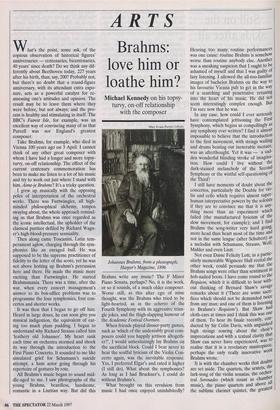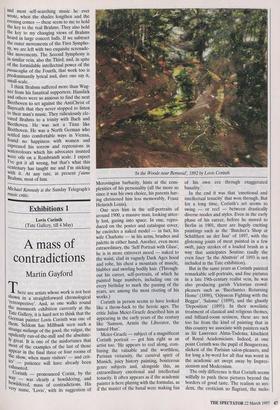ARTS
Brahms: love him or loathe him?
Michael Kennedy on his topsy- turvy, on-off relationship with the composer What's the point, some ask, of the copious observation of historical figures' anniversaries — centenaries, bicentenaries, 40 years' since death? Do we think any dif- ferently about Beethoven today, 227 years after his birth, than, say, 200? Probably not, but there's no doubt that a round-figure anniversary, with its attendant extra expo- sure, acts as a powerful catalyst for re- assessing one's attitudes and opinion. The result may be to leave them where they were before, but not always; and the pro- cess is healthy and stimulating in itself. The BBC's Fairest Isle, for example, was an excellent way of convincing many of us that Purcell was not England's greatest composer.
Take Brahms, for example, who died in Vienna 100 years ago on 3 April. I cannot think of any other great composer with whom I have had a longer and more topsy- turvy, on-off relationship. The effect of the current centenary commemoration has been to make me listen to a lot of his music and try to work out just where I stand with him. Aime-je Brahms? It's a tricky question.
I grew up musically with the opposing poles of interpretation of the orchestral works. There was Furtwangler, all high- minded philosophical alchemy, tempos swaying about, the whole approach remind- ing us that Brahms was once regarded as the iconic intellectual, the upholder of the classical purities defiled by Richard Wagn- er's high-blood-pressure sensuality.
Then along came Toscanini, Latin tem- perament aglow, charging through the sym- phonies like an enraged bull. He was supposed to be the supreme practitioner of fidelity to the letter of the score, yet he was not above hotting up Brahms's percussion here and there. He made the music more exciting than Furtwangler. He started Brahmsmania. There was a time, after the war, when every concert management's answer to its box-office problems was to programme the four symphonies, four con- certos and shorter works.
It was then that I began to go off him. Heard in large doses, he can soon give you musical indigestion, the equivalent of eat- ing too much plum pudding. I began to understand why Richard Strauss called him `leathery old Johannes'. My heart sank each time an orchestra stormed and shook its way through the introduction to the First Piano Concerto. It sounded to me like simulated grief for Schumann's suicide attempt, a ham actor going through his repertoire of gestures by rote.
All Brahms's music began to sound mid- dle-aged to me. I saw photographs of the young Brahms, beardless, handsome, romantic in a Lisztian way. But did this
Mary Evans Pidurc Library
Johannes Brahms, from a photograph, Harper's Magazine, 1896 Brahms write any music? The F Minor Piano Sonata, perhaps? No, it is the work, or so it sounds, of a much older composer. Worse still, as this alter ego of mine thought, was the Brahms who tried to be light-hearted, as in the scherzo of the Fourth Symphony with its aggressive trian- gle jokes, and the thigh-slapping humour of the Academic Festival Overture.
When friends played dinner-party games, such as 'which of the undeniably great com- posers could you happily jettison altogeth- er?', I would unhesitatingly lay Brahms on the sacrificial block. Could I bear never to hear the soulful lyricism of the Violin Con- certo again, was the inevitable response. Yes, I preferred Elgar's and rated it higher (I still do). What about the symphonies? As long as I had Bruckner's, I could do without Brahms's.
What brought on this revulsion from music I had once enjoyed uninhibitedly? Hearing too many routine performances was one cause: routine Brahms is somehow worse than routine anybody else. Another was a sneaking suspicion that I ought to be ashamed of myself and that I was guilty of lazy listening. I allowed the all-too-familiar images of bachelor Brahms on the way to his favourite Vienna pub to get in the waY of a searching and penetrative retuning into the heart of his music. He did not seem interestingly complex enough. But I'm sure now that he was.
In any case, how could I ever seriously have contemplated jettisoning the First Symphony, which begins as compellingly as any symphony ever written? I find it almost impossible to believe that the introduction to the first movement, with strings wailing and drums beating out inexorable menace, was an afterthought. Yet it was — a sud- den wonderful blinding stroke of imagina- tion. How could I live without the dark-stained melancholy of the Second Symphony or the wistful self-questioning of the Third?
I still have moments of doubt about the concertos, particularly the Double for vio- lin and cello which requires almost super- human interpretative powers by the soloists if they are to convince me that it is any- thing more than an experiment which failed (the manufactured lyricism of the slow movement, for example); and I find Brahms the song-writer very hard going, more head than heart most of the time and not in the same league (after Schubert) as a melodist with Schumann, Strauss,
Wolf, Mahler and even Liszt.
Not even Dame Felicity Lott, in a partic- ularly memorable Wigmore Hall recital the other week, could persuade me that the Brahms songs were other than sentiment in hob-nailed boots. I have come round to the Requiem, which it is difficult to hear with- out thinking of Bernard Shaw's savage remarks about it (`There are some sacri- fices which should not be demanded twice from any man; and one of them is listening to Brahms's Requiem'). But Shaw had cloth-ears at times and I think this was one of them. To hear its finale recently, con- ducted by Sir Colin Davis, with anguished high strings soaring about the choir s imprecations and with a textual clarity that Shaw can never have experienced, was to realise that it is a revelatory masterpiece, perhaps the only really innovative work Brahms wrote. It is with the chamber works that doubts are set aside. The quartets, the sextets, the lark-song of the violin sonatas, the orches- tral Serenades (which count as chamber music), the piano quartets and above all the sublime clarinet quintet, the greatest and most self-searching music he ever wrote, when the shades lengthen and the evening comes — these seem to me to hold the key to the real Brahms. They also hold the key to my changing views of Brahms heard in large concert halls. If we subtract the outer movements of the First Sympho- ny, we are left with two exquisite serenade- like movements. The Second Symphony is in similar vein, also the Third; and, in spite of the formidable intellectual power of the Passacaglia of the Fourth, that work too is predominantly lyrical and, dare one say it, small-scale.
I think Brahms suffered more than Wag- ner from his fanatical supporters. Hanslick and others were so anxious to find the next Beethoven to set against the AntiChrist of Bayreuth that they never stopped to listen to their man's music. They ridiculously ele- vated Brahms to a trinity with Bach and Beethoven. He was not a Titan like Beethoven. He was a North German who settled into comfortable ways in Vienna, found no happiness with women and expressed his sorrow and repressions in watercolours which his advocates insisted Were oils on a Rembrandt scale. I expect I ve got it all wrong, but that's what this centenary has taught me and I'm sticking with it. At any rate, at present j'aime Brahms, most of him.
Michael Kennedy is the Sunday Telegraph's music critic.



































































 Previous page
Previous page